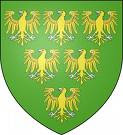Edward’s re-action to Piers’ death was one of shock at first – according to the Vita, he burst forth with –
"By God’s soul, he acted as a fool. If he had taken my advice he would never have fallen into the hands of the earls. This is what I always told him not to do. For I guessed that what has now happened would occur. What was he doing with the earl of Warwick, who was known never to have liked him? I knew for certain that if the earl caught him, Piers would never escape from his hands."
Not exactly what one would expect Edward to say about his ‘beloved brother’ – but the shock and grief he must have felt probably made him lose control of his emotions. The Vita goes on to add “But I am certain the king grieved for Piers as a father grieves for his son. For the greater the love, the greater the sorrow." His actions following Piers’ death prove this. Piers had died excommunicate and as such could not be buried in consecrated ground. His body was dressed in cloth of gold and preserved with balsam and spices. Edward ordered Thomas de London and Philip de Eyndon to watch over Piers’ body whilst he ordered prayers to be said for Piers’ soul. He also appealed to the pope to repeal the act of excommunication removed from Piers, in which he was successful. Yet still he could not bury Piers until January, 1315, when a lavish funeral ceremony was carried out by the Archbishop of Canterbury, Walter Reynolds. The earls of Pembroke and Norfolk attended. In he years between the death and burial of Piers, Edward paid the considerable sum of over £600 caring for the body and soul of Piers. Edward never forgot Piers – continuing to pay for prayers for Piers’ soul and sending gifts of remembrance to his tomb, especially on the anniversary of his death. Hamilton says of him,
‘Regardless of his many failures as a Ruler, Edward may be commended for his sense of loyalty, a constancy clearly demonstrated in his devotion to Gaveston’s memory’.
Edward also made provision for the family of Piers and swore revenge on those who had murdered him. I will deal with these areas in a later post.
Whatever anyone may have thought of Piers, he didn’t deserve to be murdered on Blacklow Hill. Arrogance, favour from the king and witty insults were not crimes. The nobles did not give Piers a fair trial – they condemn themselves by their cowardly actions – Warwick in particular, ordering him to Blacklow Hill, away from his lands, and hiding in his castle, awaiting the wrath of the king.
Sources – ‘Piers Gaveston, Edward II’s Adoptive Brother’ by Pierre Chaplain
‘Piers Gaveston, Earl of Cornwall, 1307 – 13 12’ by J. S. Hamilton
5 days ago


